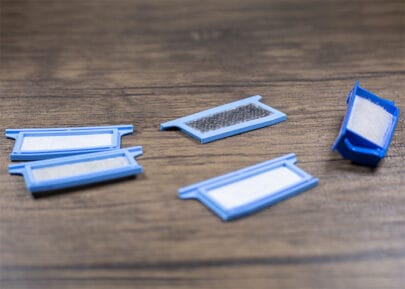
How to Find Compatible Air Filters for Your CPAP Machine
The filter is a crucial component of a CPAP machine for treating sleep apnea. Air filters help purify the air taken in by the machine.
With impurities filtered out, the machine effectively delivers pressurized air through a tube and mask into the airways.
The pressurized air helps stop the airways from collapsing and relieves the symptoms of sleep apnea, with the filter preventing inhalation of unwanted particles and allergens.
Refer to Your CPAP Machine’s User Manual
First and foremost, you should always refer to your machine’s manual for information about the filters. Not all air filters are compatible with every CPAP machine, and it is essential you know which filters work with your machine model.
When it is time to replace your filter, you want to ensure you buy the correct one. The wrong filter can impact the integrity of the machine and see you breathing in unfiltered impurities.
Some people may decide not to use their machine if they have the wrong filters, opting to wait until they have the chance to buy the right ones. However, even a single night where you forgo your sleep apnea treatment can see the symptoms return – including snoring.
Therefore, it is key to ensure you are aware which filter is compatible for your machine in advance.
Your machine’s manual will also provide further useful information. This includes the type of filter the machine uses, and recommendations on when to replace or clean filters.
Disposable CPAP Filters Vs Reusable CPAP Filters
There are two types of air filters, disposable and reusable. Most machines tend to include disposable filters but some models can feature both types of filter.
A disposable filter is just that, one which will periodically require disposal and replacement. Filters are made from thin paper-like material that is finely woven. Filters contain a small electrostatic charge which attracts the thinnest of particles.
It is recommended that disposable filters are replaced every two weeks, or sooner if they become discolored.
Reusable filters are made from absorbent foam and are designed to be washed and reused. They need to be washed every few weeks to ensure there is no buildup of particles.
These filters can be washed in warm soapy water – and, to help prevent mold, should be left to completely dry before being replaced in the machine.
A reusable filter is also referred to as a pollen filter, as it tends to sit toward the back of the device and remove larger particles and allergens such as pollen.
This type of filter can also be effective in removing pet hair and dander as well as dust. This makes reusable filters particularly useful for anyone who suffers with allergies.
Hypoallergenic Air Filters
For anyone who suffers with dust and allergens like pollen, hypoallergenic filters could be the way forward. These filters are designed with one side filtering the tiny particles from the air, while the other side traps larger particles.
Hypoallergenic filters are disposable and will need to be replaced regularly to maintain their effectiveness. How often you need to replace them can depend on environmental factors including the time of year.
These filters can be a good option for hay fever sufferers, but the filters can need replacing more often in Spring and Summer when airborne pollen is more prevalent.
Consider When to Replace a CPAP Filter
Diligently replacing your air filters is important for inhaling the purest air possible from your CPAP machine.
Although it is recommended to replace disposable filters every two weeks — and reusable filters every three months — you should keep an eye on them in case they need replacing earlier.
If filters become discolored or show signs of residue on them they should be changed irrespective of the last time they were replaced.
A reusable filter should also be replaced if the foam begins to deteriorate. Different environments can accelerate how quickly a filter may need replacing — but clean filters are vital for efficient sleep apnea treatment.
Sources:
https://www.sleepfoundation.org/best-cpap-supplies/cpap-filters
https://www.cpapmachines.ca/blogs/better-sleep-blog/washable-disposable-or-hypoallergenic-filters



